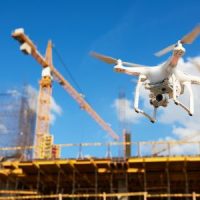Drones, Construction Projects, And Liability

So you have a large area where your new construction project is supposed to be built. As the builder, you need to get a lay of the land—an overhead view of the property, to see what will work and how, and to plan out the job site. What better way to get an overall view than to use a drone?
Why Use a Drone?
Drones (mounted with cameras) can be a great way to get a lay of the land, especially for sites that you may not have access to, or where having overhead footage may be of use. But using drones also comes with a number of legal issues that you should be aware of.
Insurance Problems
The first problem is insurance, and whether your insurance policy covers any damage or injury that could be caused by your drones (not to mention whether the drone itself is insured, if it gets damaged). Drones can crash into buildings or cars or lose parts that fall on structures or people.
Most insurance policies don’t cover drones specifically one way or the other, but many will mention “aircraft” or planes, so the question becomes whether a drone falls under those definitions.
A construction law attorney with experience in how terms are interpreted by insurance companies that insure construction policies, can help determine whether the language of your particular policy will insure you for drone-related losses.
You also may need to include a risk of loss provision, stating who–the builder or owner–will be liable for damage to property caused by the drone.
Privacy Disputes
Another problem that you may have when using drones is privacy, especially if the construction site closely abuts another property, and your drone footage or photos will include property unrelated to your site. Although technically there is no reasonable expectation of privacy in the air above us, aggrieved neighbors who see a drone snapping footage of their property, will likely start complaining, which can lead to investigations, and potential delays in the project.
Complaints about you interfering with someone’s privacy or their business, is certainly not the way you want to start off a construction project.
Is Drone Footage Enough?
Remember that drones are relatively new, and courts have not dealt with many drone related issues. For example, if your drone footage fails to find a problem, defect, or characteristic of the property where you will build, does using the drone constitute “due diligence” such that the builder can shift the expenses of change orders to the owner?
Put another way, the owner can easily say that you, as the builder, should bear the costs of any problems that arise if you chose to simply rely on drone photos or footage. If a major problem is uncovered that could have been discovered with an in-person inspection, but which was not discovered by the drone, you could have a problem.
Our Fort Lauderdale construction law attorneys at Sweeney Law P.A. at 954 440-3993 can help manage your construction law related legal problems. Call us today to avoid small legal problems from becoming big ones.

